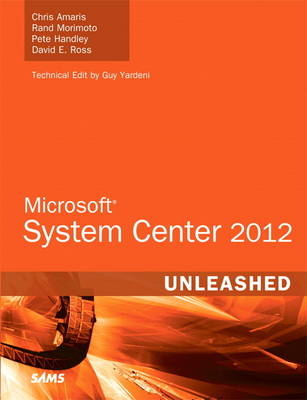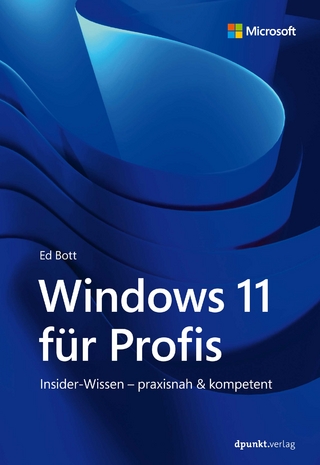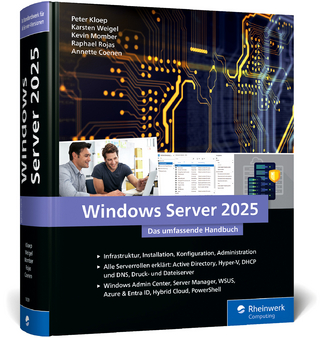
Microsoft System Center 2012 Unleashed
Sams Publishing (Verlag)
978-0-672-33612-6 (ISBN)
- Titel ist leider vergriffen;
keine Neuauflage - Artikel merken
This is the definitive real-world guide to Microsoft System Center 2012, Microsoft’s newest and most powerful version of System Center. Authored by consultants who’ve deployed System Center in hundreds of enterprises and innovative smaller businesses, this book brings together up-to-the-minute tips, tricks, and techniques you just won’t find anywhere else.
You’ll learn how to use System Center’s powerful capabilities to build highly-efficient managed environments that encompass datacenters, cloud environments, client computers, mobile devices, and more. The authors address planning, design, implementation, integration, and administration, and cover every component, including Configuration Manager, Operations Manager, Data Protection Manager, Virtual Machine Manager, Service Manager, and Orchestrator.
Use Configuration Manager 2012 to deliver software and updates in highly-distributed environments including datacenters, clouds, and mobile devices
Reliably manage and report on assets with Configuration Manager 2012
Perform monitoring, alerting, operations, and security reporting with Operations Manager 2012
Use Data Protection Manager 2012to protect file systems, SQL, Microsoft Exchange, and SharePoint
Leverage Data Protection Manager 2012’s improved central monitoring and remote recovery
Run Hyper-V virtualized environments with VMM 2012—including new private clouds and mixed private/public fabrics
Use Service Manager 2012 to provide top-down integration, and use Orchestrator 2012 for bottom-up process automation and integration “glue”
Give users an efficient self-service portal for creating service and incident requests and browsing service catalogs
Manage service offerings and implement enterprise-wide change control with Service Manager 2012
Ensure compliance by creating, executing, and repeating auditable, documented processes with Orchestrator 2012
Chris Amaris, MCITP, MCTS, CISSP/ISSAP, CHS III, is the chief technology officer and cofounder of Convergent Computing. He has more than 20 years experience consulting for Fortune 500 companies, leading companies in the technology selection, design, planning, and implementation of complex information technology projects. Chris has worked with Microsoft System Center products, such as Operations Manager and Configuration Manager, since their original releases in 2000 and 1994. He specializes in messaging, security, performance tuning, systems management, and migration. Receiving his first Microsoft technologies certification in 1993, Chris is a current Microsoft Certified IT Professional (MCITP) with multiple Microsoft Certified Technology Specialist designations (MCTS) in System Center technologies, a Certified Information Systems Security Professional (CISSP) with an Information System Security Architecture Professional (ISSAP) concentration, Certified Homeland Security (CHS III), a Novell CNE, a Banyan CBE, and a Certified Project Manager. Chris is also an author, writer, and technical editor for a number of IT books, including Network Security for Government and Corporate Executives, Exchange 2010 Unleashed, and Microsoft Windows Server 2008 R2 Unleashed. Rand Morimoto, Ph.D., MVP, MCITP, CISSP, has been in the computer industry for over 30 years and has authored, coauthored, or been a contributing writer for dozens of books on Windows, Security, Exchange, BizTalk, and Remote and Mobile Computing. Rand is the president of Convergent Computing, an IT-consulting firm in the San Francisco Bay area that has been one of the key early adopter program partners with Microsoft, implementing the latest Microsoft technologies, including Microsoft Windows Server 2008 R2, System Center 2012, Windows 7, Exchange Server 2010, Windows Server 2012, and SharePoint 2010 in production environments over 18 months before the initial product releases. Pete Handley, MCITP, CISSP, has more than 15 years of experience in IT, including extensive knowledge of Active Directory, Microsoft Exchange, Windows Server 2008, and the System Center suite of products. He has been a contributing author for the Sams books Microsoft Exchange 2003 Unleashed and Windows PowerShell Unleashed. Pete specializes in Visual Basic and PowerShell scripting and is a subject matter expert on the integration and migration of Novell technologies to Microsoft technologies. Pete holds the Microsoft Certified Systems Engineer 2003 (MCSE) certification, the Microsoft Certified Information Technology Professional (MCITP) certification, the Novell Certified Directory Engineer (CDE) certification, and the Certified Information Systems Security Professional (CISSP) certification. David E. Ross, MCITP, VCP, CCEA, CCSP, has over 13 years of experience in IT consulting, the majority of which have been spent playing the lead architect role on network design and implementation projects throughout the San Francisco Bay area. David is currently acting as a principal engineer for Convergent Computing, and is frequently involved in creating hybrid solutions involving multiple vendor technologies for organizations of all sizes. Specialties for David include Active Directory, Exchange, System Center, Lync, Citrix XenApp and XenDesktop design, virtualization solutions using VMware vSphere and Microsoft Hyper-V, and Cisco routing, switching, and security technologies.
Introduction 1
1 Overview of the System Center Suite 5
What Is System Center? 6
Understanding System Center Configuration Manager 9
Understanding System Center Operations Manager 18
Understanding System Center Data Protection Manager 26
Understanding System Center Virtual Machine Manager 34
Understanding System Center Service Manager 40
Understanding System Center 2012 Orchestrator 45
Understanding System Center Licensing 50
Summary 51
Best Practices 52
2 Configuration Manager 2012 Design and Planning 55
What’s New in ConfigMgr 2012 56
Explaining How Configuration Manager Works 60
Understanding Content Distribution 66
Understanding Asset Management 70
Reporting from Configuration Manager 74
Configuration Manager Architecture Components 75
Securing Configuration Manager 88
Understanding Component Requirements 92
Configuration Manager Design Considerations 94
Understanding Client Schedules 105
Planning for Internet-Based Client Management 106
Putting It All Together in a Design 110
Summary 112
Best Practices 112
3 Configuration Manager 2012 Implementation and Administration 115
Sample Organization 115
Configuring Installation Prerequisites 118
Implementing the Central Administration Site 124
Deploying the Primary Sites 129
Deploying the Secondary Sites 134
Configuring the Hierarchy 138
Configuring Sites 148
Configuring Client Settings 156
Implementing Internet-Based Client Management 163
Summary 177
Best Practices 178
4 Using Configuration Manager 2012 to Distribute Applications, Updates, and Operating Systems 181
Understanding Content Distribution 181
Defining Collections 185
Understanding Application Management 189
Managing Deployments 203
Understanding Software Updates 215
Deploying Software Updates 219
Understanding Operating System Deployment 225
Deploying Operating Systems 234
Extending with Microsoft Deployment Toolkit 238
Summary 243
Best Practices 243
5 Using Configuration Manager 2012 for Asset Management and Reporting 245
Understanding Asset Data 246
Configuring Client Settings for Inventory Collection 248
Understanding Reporting 249
Customizing Hardware Inventory 261
Understanding Asset Intelligence 269
Understanding Software Metering 277
Understanding Compliance Settings 278
Monitoring the Baselines and Compliance 283
Summary 285
Best Practices 285
6 Operations Manager 2012 Design and Planning 289
What’s New With Operations Manager 2012 290
Understanding How OpsMgr Works 291
OpsMgr Architecture Components 296
Securing OpsMgr 311
Fault Tolerance and Disaster Recovery 317
Understanding OpsMgr Component Requirements 323
OpsMgr Design Considerations 328
Putting It All Together in a Design 335
Planning an Operations Manager Deployment 345
Summary 353
Best Practices 354
7 Operations Manager 2012 Implementation and Administration 355
Installing Operations Manager 2012 356
Deploying OpsMgr Agents 373
Monitoring DMZ Servers with Certificates 385
Configuring Operations Manager 2012 393
Administering Operations Manager 2012 403
Backing Up OpsMgr 2012 411
Summary 418
Best Practices 418
8 Using Operations Manager 2012 for Monitoring and Alerting 421
Using OpsMgr Consoles 422
Working with Management Packs 425
Exploring the Operations Manager Management Pack 432
Exploring the Windows Management Pack 440
Exploring the Active Directory Management Pack 451
Exploring the Exchange 2010 Management Pack 466
Exploring the SQL Server Management Pack 478
Exploring the Cross Platform Management Packs 487
Management Pack Templates 491
Custom Management Packs 503
Summary 508
Best Practices 508
9 Using Operations Manager 2012 for Operations and Security Reporting 511
Reporting from OpsMgr 512
Generating and Scheduling Reports 514
OpsMgr 2012 Maintenance Reports 532
Audit Collection Services Reporting 541
Service Level Tracking 548
OpsMgr 2012 Dashboards 554
Publishing Dashboards into SharePoint 2010 561
Summary 565
Best Practices 566
10 Data Protection Manager 2012 Design, Planning, Implementation, and Administration 567
What Is System Center Data Protection Manager? 568
Data Protection Manager Background 572
Data Protection Manager Prerequisites 578
Planning a Data Protection Manager Deployment 580
Deploying Data Protection Manager 587
Completing Required Configuration Tasks 591
Creating Protection Groups 601
Administrating Data Protection Manager 606
Summary 616
Best Practices 617
11 Using Data Protection Manager 2012 to Protect File Systems, Exchange, SQL, and SharePoint 619
Protecting File Servers 620
Protecting System State 622
Protecting Exchange Servers 624
Protecting SQL Servers 635
Protecting SharePoint Farms 643
Protecting Virtualized Environments 654
Summary 660
Best Practices 661
12 Virtual Machine Manager 2012 Design, Planning, and Implementation 663
Understanding Virtual Machine Manager 663
Virtual Machine Manager Background 673
What’s New in System Center Virtual Machine Manager 2012 677
Virtual Machine Manager Prerequisites 678
Planning a Virtual Machine Manager Deployment 682
Deploying Virtual Machine Manager 687
Summary 700
Best Practices 701
13 Managing a Hyper-V Environment with Virtual Machine Manager 2012 703
Understanding the VMM Private Cloud 704
Using the VMM Management Interfaces 707
Understanding Virtual Machine Conversions 716
Managing VMM User Roles 729
Deploying Virtual Machines 740
Migrating Virtual Machines 747
Understanding and Implementing Server App-V 753
Summary 758
Best Practices 759
14 Service Manager 2012 Design, Planning, and Implementation 761
What’s New in Service Manager 2012 762
Explaining How Service Manager Works 763
Service Manager Design Parameters 769
Putting It All Together in a Service Manager Design 775
Planning a Service Manager Deployment 783
Deploying Service Manager 791
Deploying Service Manager Connectors 805
Backing Up Service Manager 2012 814
Summary 817
Best Practices 817
15 Using Service Manager 2012 for Incident Tracking and Help Desk Support 819
Incidents and Problems 819
Configuring Incident Settings 821
Service Manager Notifications 830
Creating New Incidents 836
Working with Incidents 846
Configuring Problem Settings 856
Working with Problems 859
Incident and Problem Reports 863
Summary 869
Best Practices 870
16 Using Service Manager 2012 for Service Offerings and Change Control Management 871
Service Manager 2012 and the Infrastructure Optimization Model 871
Service Offerings and Request Offerings in SM 2012 872
Release Management in SM 2012 882
Change Requests and Activities 885
Configuring Change Settings 887
Change Management Templates and Workflows 889
Initiating Change Requests 892
Working with and Approving Change Requests 896
Implementing Change Requests 903
Managing Configuration Items 910
Working with Change, Activity, and Configuration Management Reports 914
Summary 919
Best Practices 920
17 System Center Orchestrator 2012 Design, Planning, and Implementation 921
Overview of System Center Orchestrator 921
History of System Center Orchestrator 924
System Center Orchestrator 2012 Installation Prerequisites 924
Orchestrator Security Planning 926
Installing System Center Orchestrator 2012 on a Single Server 928
Installing System Center Orchestrator 2012 on Separate Systems 933
Additional Tasks Following Orchestrator Installation 939
Getting Familiar with the Orchestrator 2012 Management Consoles 942
Installing Integration Packs 949
Designing and Using Runbooks 952
Runbook Permissions 967
Summary 967
Best Practices 968
Index 969
| Erscheint lt. Verlag | 14.6.2012 |
|---|---|
| Verlagsort | Indianapolis |
| Sprache | englisch |
| Maße | 181 x 231 mm |
| Gewicht | 1562 g |
| Themenwelt | Informatik ► Betriebssysteme / Server ► Windows |
| Mathematik / Informatik ► Informatik ► Netzwerke | |
| ISBN-10 | 0-672-33612-X / 067233612X |
| ISBN-13 | 978-0-672-33612-6 / 9780672336126 |
| Zustand | Neuware |
| Informationen gemäß Produktsicherheitsverordnung (GPSR) | |
| Haben Sie eine Frage zum Produkt? |
aus dem Bereich


